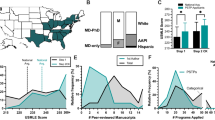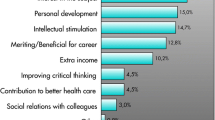Abstract
A survey of 170 Swedish mentors of PhD-students found that expertise in the research field and avoidance of conflict of interest were big motivators for finding an examiner from abroad for PhD theses. The survey also identified that concern by supervisors for facilitating the career paths of younger scientists in terms of introductions to potential labs for post-doctoral work and obtaining high quality neutral review of one’s research was also important, as was the desire to set up collaborations. An expectation from the management of one’s university of the PR-value of a foreign senior person as examiner also played a part. Although few were willing to admit that PR for one’s own group was a motivating factor. A small fraction of responders expressed concern that, as some of the costs of the PhD-examination were being shifted on to the research groups themselves, this might impact the current situation. Language also played a subordinate role. To get the best out of the visiting examiner, it was important to educate and instruct them in their role in a Swedish PhD-examination protocol. Male supervisors had had more PhD-candidates than female, but they also had used more Sweden-based examiners than their female colleagues. We conclude that using a foreign examiner was motivated by factors that are likely to prevail for the foreseeable future. This Swedish practice may also provide a template for a common standard.


Similar content being viewed by others
References
Breimer, L. H. (1996a). Authorship and usage of published papers in current Swedish biomedical theses. Scientometrics, 36, 255–258.
Breimer, L. H. (1996b). Age, sex and standards of current doctoral theses by Swedish medical graduates. Scientometrics, 37, 171–176.
Breimer, L. H. (2010a). Swedish biomedical PhD examination: An international forum and a proposed procedure for Europe. Scientometrics, 83, 583–587.
Breimer, L. H. (2010b). A group comparison between Swedish MD–PhDs of 1991 and 2000. Journal of the International Association of Medical Science Educators (JIAMSE), 20, 10–13.
Breimer, L. H. (2013). Impact of foreign external PhD examiners on academic collaboration patterns. Scientometrics, 96(1), 315–322.
Breimer, L. H., & Breimer, D. D. (1995). A computer-based international “Thesis-line”? Trends in Biochemical Sciences (TibS), 20, 175–176.
Breimer, L. H., & Leksell, J. (2011). Longitudinal and cross-sectional study of registered nurses in Sweden who undertake a PhD showing that nurses continue to publish in English after their PhD but male nurses are more productive than female nurses. Scientometrics, 87(2), 337–345.
Breimer, L. H., & Mikhailidis, D. P. (1991). A thesis for all seasons. Nature, 353, 789–790.
Breimer, L. H., & Mikhailidis, D. P. (1993). Towards a doctoral thesis through published works. Biomedicine & Pharmacotherapy, 1993(47), 403–407.
Breimer, L. H., & Nilsson, T. K. (2010). A longitudinal and cross-sectional study of Swedish biomedical PhD processes 1991–2009 with emphasis on international and gender aspects. Scientometrics, 85, 401–414.
EC (European Commission). (2003). She figures 2003. Women and science statistics and indicators. Luxembourg: Office for the Official Publications of the European Communities (pp. 114). Available at http://ec.europa.eu/research/science-society/pdf/she_figures_2003.pdf.
Karlsson, S. (2010). Swedish production of highly cited scientific publications. Vetenskapsrådets lilla rapportserie, 1, 1–21.
Pettigrew, A. G. (2012). Australia’s position in the world of science, technology and innovation. Office of the Chief Scientist, Canberra, Occasional Paper Series, 2012(2), 1–4.
Author information
Authors and Affiliations
Corresponding author
Appendix: the questionnaire translated into English
Appendix: the questionnaire translated into English
[NB—the questions were not numbered in the questionnaire that was distributed, so as to avoid any possible bias based on a perceived order of importance among the questions.]
You have used an external examiner who came from outside the country. All researchers (opponents) are experts in their subject area. However, there are several other reasons for appointing an examiner. We would therefore be grateful if you could provide some reflections on why, in addition to subject matter expertise, you chose an international opponent.
My institution: …; Town: …; The examiner’s country: …
Reasons for (expectations underlying) the invitation of a foreign-based examiner (several choices possible): [there were 5 boxes ranging from “Important” to “Unimportant”].
-
Q1. Well recognized as a good examiner.
-
Q2. Faculty leadership is keen to have foreign opponents.
-
Q3. We thought about/wanted to explore the possibility of cooperative work.
-
Q4. Our group’s “turn” to have an opponent from abroad.
-
Q5. A foreign opponent would raise the profile of my group.
-
Q6. We had published together before.
-
Q7. Recommended by colleague.
-
Q8. Already planned that she/he should visit the university anyway.
-
Q9. Examiner hailing from afar was already in Europe, had not far to travel.
-
Q10. I will be more restrictive to invite a foreign examiner.
-
Q11. My PhD-student would not be able to defend [the thesis] in English.
Other reasons: …….
Free reflections on the theme: …
During the years, I have used … foreign and … domestic external examiners.
Rights and permissions
About this article
Cite this article
Breimer, L.H., Nilsson, T.K. Considerations for appointing an external examiner of a PhD in the biomedical sciences in Sweden: a questionnaire-based survey. Scientometrics 98, 2039–2049 (2014). https://doi.org/10.1007/s11192-013-1150-1
Received:
Published:
Issue Date:
DOI: https://doi.org/10.1007/s11192-013-1150-1




